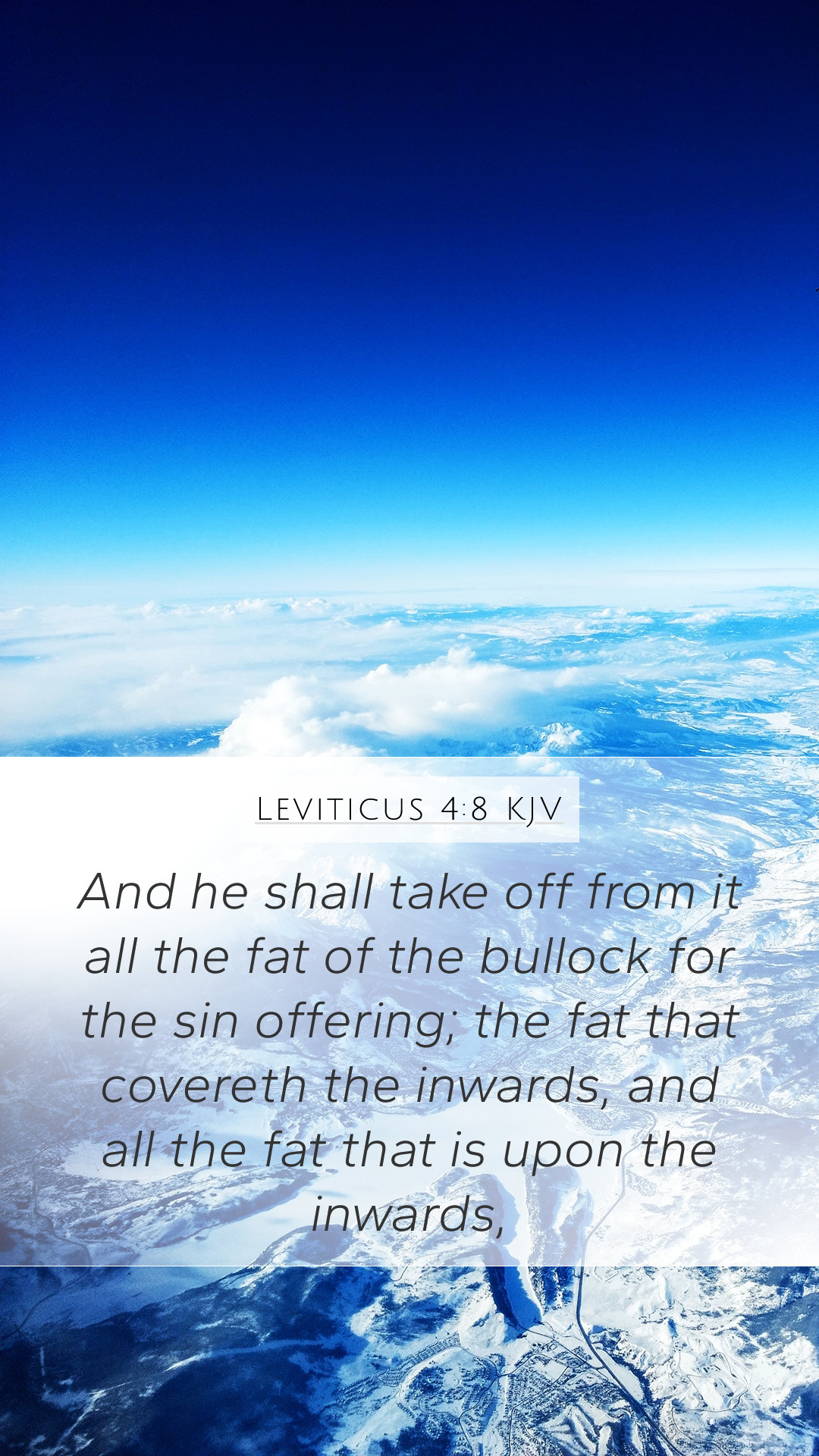Understanding Leviticus 4:8: A Comprehensive Bible Verse Commentary
Leviticus 4:8 states, "And the priest shall take off from it all the fat of the bullock for the sin offering; the fat that covereth the inwards, and all the fat that is upon the inwards." This verse is part of the laws concerning sin offerings, which play a significant role in the sacrificial system established in the Old Testament.
The process described highlights the importance of the fat in sacrificial offerings, showing that it was considered the best part of the animal. This commentary synthesizes insights from public domain commentaries, including those by Matthew Henry, Albert Barnes, and Adam Clarke, to provide a deeper understanding of this scripture.
Meaning of Leviticus 4:8
This verse symbolizes the dedication of the best parts of the animal to God, illustrating the necessity of offering what is most valuable as a sign of repentance and worship. The fat represented abundance and was often viewed as the best portion of the sacrifice, intended for God alone.
Insights from Commentaries
- Matthew Henry: Henry emphasizes the significance of this offering, noting that the fat was a symbol of the abundance that God provides. He explains that the act of offering the fat symbolizes the believer's acknowledgment of God's sovereignty and generosity.
- Albert Barnes: Barnes focuses on the ritualistic aspects of this offering, noting that the removal of the fat must be performed in a precise manner. This highlights the seriousness of approaching God with one's sin offerings, underscoring the need for purification and atonement.
- Adam Clarke: Clarke provides insight into the cultural context of offerings. He points out that in Israelite society, fat was considered a delicacy. Thus, the offering of fat would have been an act of both reverence and gratitude towards God.
Biblical Exegesis
The exegesis of Leviticus 4:8 reveals several layers of meaning:
- Symbolism of Fat: The fat signifies richness and value. Offering the fat represents giving one's best to God, urging believers to reflect on their priorities in worship.
- Ritual Purity: The section of scripture emphasizes the need for purity in worship. Removing fat correctly is part of the ritual cleanliness that was required in approaching God.
- Collective Responsibility: This sacrificial system illustrates the collective nature of sin and the community's responsibility to atone before God.
Historical Context of Scripture
In the ancient Israelite context, sacrifices were integral to worship and covenant relationship with God. The sin offering was meant to atone for unintentional sins, indicating that even unintentional transgressions required a response of repentance.
Application of Leviticus 4:8 Today
For modern believers, Leviticus 4:8 serves as a reminder of the importance of sincerity in repentance. It encourages individuals to consider what they offer to God in their lives—our time, talents, and resources should be offered as sacrifices to Him.
Connecting with Bible Study Groups
This verse can form the basis for discussions in bible study groups, helping members to explore themes of sacrifice, repentance, and worship. Understanding scripture in a communal setting enhances Biblical learning and encourages personal and spiritual growth.
Cross References
- Leviticus 4:3 - discusses the anointed priest's sin sacrifice.
- Leviticus 4:20 - describes the sin offering for the congregation.
- Numbers 15:27 - addresses unintentional sin in the community.
- Romans 12:1 - presents the idea of presenting our bodies as living sacrifices.
- Hebrews 9:22 - clarifies the significance of blood in atonement.
Conclusion
Leviticus 4:8, when viewed through the lens of Bible verse meanings and thorough bible verse interpretations, reveals profound spiritual truths about sacrifice and God’s holiness. Understanding Scripture demands reflection on its context and implications for personal faith practices.
For those engaged in bible study lessons or seeking to deepen their Bible study insights, the principles from this verse encourage an approach of gratitude and reverence towards God, solidifying our relationships with Him and others.


